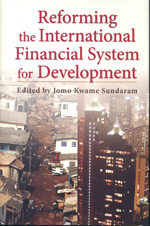Reforming the international financial system for development
- ISBN: 9780231157643
- Editorial: Columbia University Press
- Fecha de la edición: 2010
- Lugar de la edición: New York. Estados Unidos de Norteamérica
- Encuadernación: Cartoné
- Medidas: 23 cm
- Nº Pág.: 392
- Idiomas: Inglés

Ed. Jomo Kwame Sundaram. The 1944 Bretton Woods conference created new institutions for international economic governance. Though flawed, the system led to a golden age in postwar reconstruction, sustained economic growth, job creation, and postcolonial development. Yet financial liberalization since the 1970s has involved deregulation and globalization, which have exacerbated instability, rather than sustained growth. In addition, the failure of Bretton Woods to provide a reserve currency enabled the dollar to fill the void, which has contributed to periodic, massive U.S. trade deficits. Our latest global financial crisis, in which all these weaknesses played a part, underscores how urgently we must reform the international financial system. Prepared for the G24 research program, a consortium of developing countries focused on financial issues, this volume argues that such reforms must be developmental. Chapters review historical trends in global liquidity, financial flows to emerging markets, and the food crisis, identifying the systemic flaws that contributed to the recent downturn. They challenge the effectiveness of recent policy and suggest criteria for regulatory reform, keeping in mind the different circumstances, capacities, and capabilities of various economies. Essays follow ongoing revisions in international banking standards, the improved management of international capital flows, the critical role of the World Trade Organization in liberalizing and globalizing financial services, and the need for international tax cooperation. They also propose new global banking and reserve currency arrangements.
Ed. Jomo Kwame Sundaram






